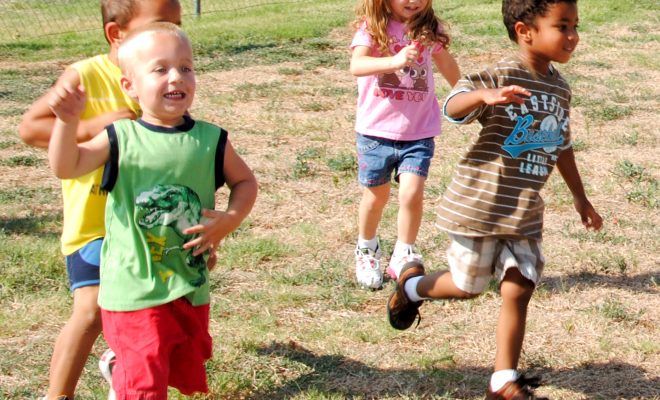Want an Olympic legacy? Get primary school children trying out a range of different sports

James Rudd, Liverpool John Moores University and Colum Cronin, Liverpool John Moores University
With sports lovers still basking in the gleam of Great Britain’s Olympic medal haul from Rio and now looking forward to a clutch of golds at the Paralympics, a BBC campaign is encouraging British school children to “Get Inspired” by Team GB’s success and emulate their sporting heroes.
However laudable this is, it comes amid a general decline in children’s basic skills at running, jumping, throwing, catching and kicking. Worrying findings across the world show that the movement skills of today’s children are less well developed than previous generations. A recent study in the UK also found children’s movement skills to be poor.
Without these basic skills at moving, most children will fail to find “their sport”. Research has found that children who are skillful tend to be more confident in their ability to perform these skills and, consequently, are more likely to engage in physical activity, which in turn creates opportunities for further skill development. The reverse is also true. Children with low skill levels are less likely to have confidence in their abilities, are less likely to engage in physical activity and, over time, are more likely to drop out of sport and become obese.
Get children moving
There is now a body of work that argues that the primary school years are crucial in the path to both lifelong physical activity and elite sports performance. During this phase, children are in what’s called their “sampling years”, where the emphasis should be on experimenting with new or different kinds of movement while having fun.
Recent research has also shown that skill development at this critical stage is too important to leave to an ad-hoc approach. The study was led by one of us, James Rudd. By monitoring 333 children with an average age of eight, we found that a 16-week programme of educational gymnastics – tumbling, jumping, controlled falling and moving in gravity-defying ways – gave a boost to their stability and object-control skills. These movements are essential aspects of skill development as they enable children to maintain their balance and retain control of their bodies in dynamic situations. The mechanisms which control balance are tightly linked to our sensory system and, as such, are integral not only to sports, but to everything we do.
So while young children shouldn’t just focus on gymnastics, it should be included as part of a balanced and varied training programme that involves lots of varied movements. One example of this can be seen with RSC Anderlecht, an elite sport club implementing a sampling approach combining football and gymnastics.
Take your pick
Sampling a wide range of different sports can not only help develop children’s movement skills but also their emotional and cognitive skills. One moment they’re playing football with ten other children and are only allowed to use their feet and two days later they’re playing basketball with four other children and are only allowed to use their hands.
This sampling develops a broad set of physical competencies that can transfer from one sport to another. It also teaches children to understand tactics, which can be transferable from one sport to another. For example, creating space in basketball has much in common with football, while outwitting an opponent in badminton is similar to tennis and volleyball. Children can also learn psychological skills such as how to set goals that they can use both in other sports, and other areas of life.
There are also social benefits, as playing a range of sports connects young people to a range of friends and role models. Young people who specialise in one sport may have a narrow range of friends and their sense of identity is often fragile as it is largely focused on one sport, for example: “I am a footballer”. This might not end well if the young person is released from their football club resulting in the loss of their social network, positive identity, and potential career.
Learn from the best
Specialising in one sport at an early age can lead to burn out as young people can lose the love of sport and their intrinsic motivation. This is not to say that participants should never focus on a specific sport, rather that participants should develop a good foundation of skills by sampling a range of activities until their early teens.

Adam Peaty: a golden swim at Rio 2016. Owen Humphreys / PA Wire
Perhaps a good example of this is the 21-year-old Olympic swimming sensation Adam Peaty who reportedly only started training specifically in swimming at the age of 14. Four-time Olympic gold medallist Laura Trott also participated in a range of sports including trampoline and swimming before specialising in cycling at 14. In 2013, a retrospective analysis of 1,006 athletes in the UK found that those who competed in three or more sports at age 11 were significantly more likely to compete at national level when they are 18 than those who only competed in one sport.
There are lots of different ways for children to get involved in different sports. This can be as simple as parents providing opportunities for play in the back garden or at a local park, or finding out about classes taught by specialist coaches at their nearest sports centre. As children start the new school year it is important teachers make sure that children are experiencing a varied and substantial physical education curriculum. The route to both Olympic medals (in most sports) and lifelong participation begins by experimenting, tasting, and playing a wide range of sporting activities.
![]()
James Rudd, Senior lecturer in Physical Education, Liverpool John Moores University and Colum Cronin, Senior lecturer, Liverpool John Moores University
This article was originally published on The Conversation. Read the original article.





